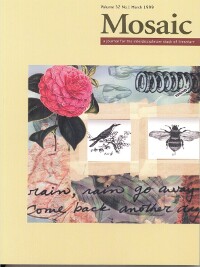Issue 32.1
Overview

General Issue
Published: March 1999
View the issue introduction or see the issue summary and contents below.
10 essays, totalling 192 pages
$15.00 CAD
Boasting a new look—inspired by the preceding year’s Interarts Project—this general issue of Mosaic features essays exploring authorship, violence, censorship, and economies. The essays address literature and film from the classic Oresteia to the late-twentieth-century The Comfort of Strangers, Robert Herrick’s Memoires to Francis Ford Coppola’s The Godfather, and more.
Ideology, Rhetoric and Blood-Ties: From The Oresteia to The GodfatherJohn Krapp Using a comparative analytical approach to the phenomena of honor, guilt, and absolution in The Oresteia and The Godfather trilogies, this essay investigates both ideology’s compelling force in determining social relations and the distinct rhetorical strategies used in two different cultures to support these relations. | |
Tropes and Parodies of Capitalist Biography: Carnegie’s ’Gospel of Wealth’ vs. Herrick’s MemoirsWm. M. Phillips In the late 19th century, advocates of capitalism found biography an ideal genre for promoting the virtues of individualism. Focusing first on the way that Robert Herrick attempted to parody the form for satiric purposes, this essay then looks at the Christian rhetoric employed by Andrew Carnegie in his counter critique or “Gospel of Wealth.” | |
Death in Venice in Literature and Film: Six 20th-Century VersionsGeorge B. von der Lippe Thomas Mann’s Death in Venice serves as a 20th-century archetype of a tale of Venice as labyrinth fatal to the northern visitor. This essay discusses Mann’s novella in relation to Daphne du Maurier’s “Don’t Look Now” and Ian McEwan’s The Comfort of Strangers, as well as the three films which they inspired. | |
Answering as Authoring: or, Marxism’s JoycePeter Hitchcock Shifts in Marxist positions on Joyce can be viewed as an index of specific crises within Marxist thought. Enlisting Bakhtin’s work on answerability, and with a view to deepening our sense of the intersection of social theory and culture, this essay argues that the major pitfall in Marxist readings of Joyce has been an inadequate theory of authorship. | |
Critical Mirrors: Theories of AutobiographyCharles Berryman Arguing that the study of autobiography is driven by questions that mirror the practice and theory of larger critical trends—from the philosophy of language to the politics of cultural identity in recent criticism—this essay traces the evolution of autobiographical theory in the 20th century. | |
Staging Cultural Violence: Griselda Gambaro and Argentina’s “Dirty War”Myriam Yvonne Jehenson Focusing on the link between politics and art in Griselda Gambaro’s play Information for Foreigners, this essay explores the ways that she represents both the overt mechanisms at work in Argentina and the unconscious and culturally-produced ideologies operating in its psyche during the repressive regime of the 1970s. | |
Space and Power: 19th-Century Urban Practice and Gibson’s CyberworldTony Fabijancic Approaching modernity as a reified space-vision construct, this essay examines how some of its particular manifestations which originate in the 19th-century metropolis continue to be evident in William Gibson’s cyberpunk trilogy, especially in the form of new business imperatives, new techniques which alter “natural” bodies, and new kinds of vision issuing from strange virtual dimensions. | |
Making Knowledge: Bioepistelmology and the Foundations of Literary TheoryNancy Easterlin Asserting that “strong constructivism” is not a viable basis for literary theory, this essay draws on evolutionary psychology, the philosophy of science,and cognitive psychology to demonstrate how a bioepistemological perspective not only revolutionizes general theories of knowledge, but also reinvigorates literary studies. | |
Affirming the Indeterminable: Deconstruction, Sociology, and Tobias Wolff’s “Say Yes”Colm J. Kelly Addressing the current emphasis on broadly sociological-contextualist approaches to literature, this essay uses Tobias Wolff’s short story “Say Yes” to explore the viability of three possible interpretations and attempts to delineate the nature of a deconstructive approach. | |
Internet Censorship as “Cybriety”: Freud, McLuhan, and Media PleasuresTony Tremblay Applying the lessons of literary and cultural history to reveal how early media were manifest and received as “pleasured” texts, this essay combines the theories of McLuhan, Bakhtin, and Mulvey to make sense of the Internet, the new media complex which daily appears more incomprehensible and beyond our control. |